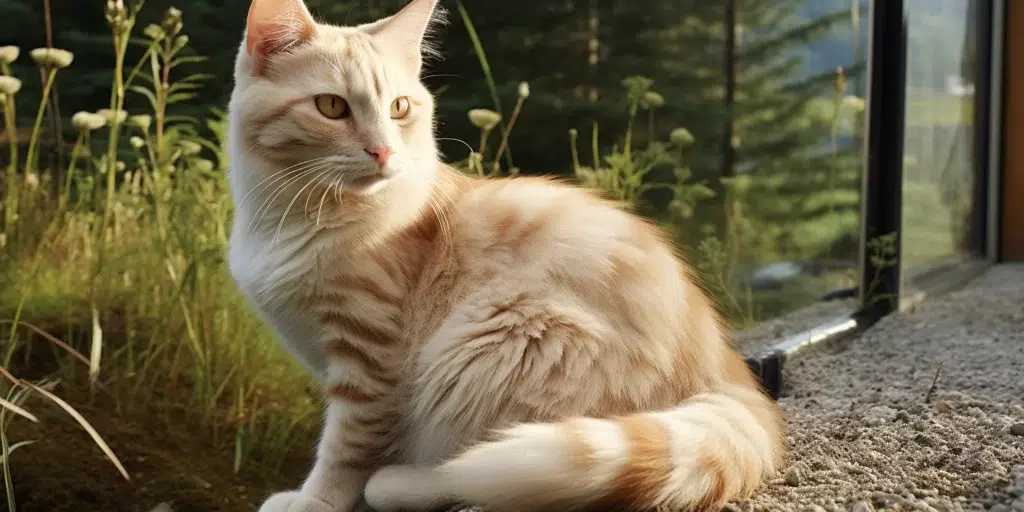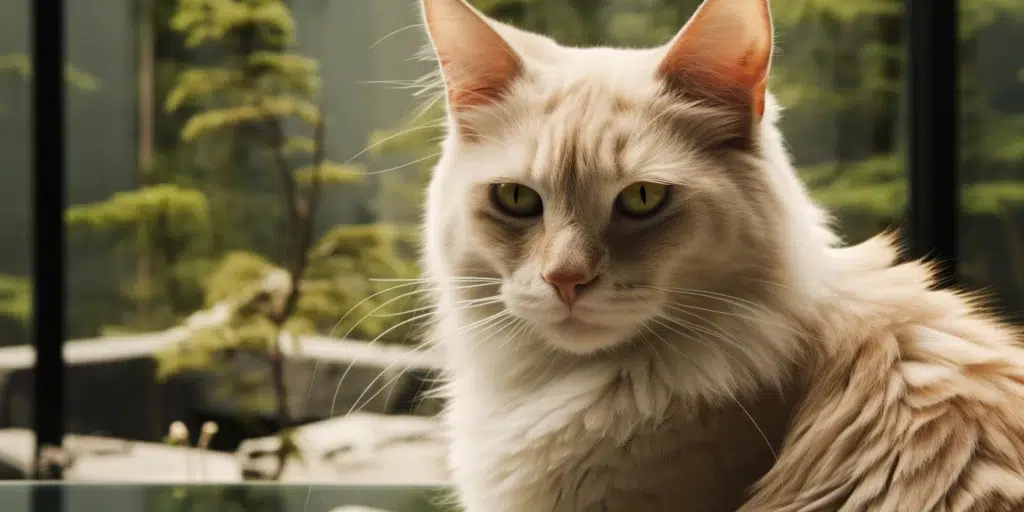The Javanese is a beautiful, slender, medium-sized cat that makes an excellent pet for any home. This breed has a silky, glossy coat of long yet fine fur with no undercoat.
The head is shaped in a distinct triangular shape, and the ears are set so they appear to be an extension of this triangle. Their deep eye color, either blue or green, must be very vivid and intense to meet breed standards.
Javanese cats generally have sweet temperaments, making them great companions who love being around people and other pets in the house.
If you are interested in learning more about this unique breed of cat, then look no further! Here we will dive into all the care requirements for Javanese cats, as well as many helpful tips and tricks that can help you become a better owner.
So don’t wait any longer—read on to learn more about these beautiful felines!

Breed Overview
The Javanese cat breed has a fascinating story that began in North America. The breed emerged from Balinese cats, which were then crossbred with Siamese, Colorpoint Shorthairs, and other Balinese cats. The aim was to create cats with unique point coloration, such as tabby points and cream points.
The name “Javanese” follows the trend of naming Oriental-type cats after Southeast Asian locations, linking them to an exotic heritage. The breed made its mark in the 1950s when Helen Smith from MerryMews Cattery coined the term “Javanese.”
However, the breed we know today as Javanese gained recognition in the late 1970s. Breeders sought to introduce new colors into the Balinese breed and campaigned for its acceptance by the Cat Fanciers’ Association (CFA).
In 1979, these colorful felines caught the CFA’s eye and were registered, but they could not compete until later. It wasn’t until 1984 that they achieved provisional status, and two years later, they celebrated full championship status within the CFA. But later, they integrated it as a division of the Balinese.
The recognition of the Javanese cat breed varies among different cat associations, which can be quite confusing. Each registry have its own set of rules and classifications, making the Javanese breed a topic of many fascinating discussions among cat lovers.
The World Cat Federation (WCF), for example, groups similar breeds under the single category of Colorpoint. It’s a diverse and vibrant tapestry of recognition that highlights the breed’s distinctiveness across the globe.
The Javanese are known for their medium-long soft coats with unique non-traditional point colorations. Previously, back-crossing with other related breeds was common for genetic diversity.
Nowadays, breeding regulations have become stricter to maintain the breed’s distinct characteristics. Despite changes over time, cat lovers worldwide continue to adore the Javanese.
With their playful nature and striking looks, these cats certainly have a special place in the world of feline breeds.
Identifying Javanese Cat
The Javanese is an elegant feline charmer, notable for its slender, graceful body and striking features. You can spot a Javanese cat by its medium-long, silky coat that comes in a variety of non-traditional point colorations.
They might flaunt lynx (tabby), tortoiseshell, red, or cream points that stand out against their lighter body color. They have long, svelte frames topped with wedge-shaped heads and large, wide-set ears which give them a look of constant alertness.
Their eyes are almond-shaped, expressive, and can come in a brilliant shade of blue or green, adding to their alluring appearance. The breed’s fine-boned legs lead to dainty paws, and they often have long, plumed tails that wave like flags behind them.
Their elegant fur and striking colors combine to create a dazzling appearance that’s both exotic and beautiful.
These characteristics not only set them apart in looks but also embody their active and playful nature. Whether perched on a high shelf or stretching out in a sunbeam, the Javanese cat’s appearance is as distinctive as its history.

Personality Traits
The Javanese is an intelligent, social cat that loves to be around people and likes to interact with them. They are also very active and agile cats who love to play. Javanese cats are very vocal and will let you know what they want or don’t want.
They can be quite demanding, but they also have a lot of love to give if given enough attention from their owners. They need plenty of stimulation to stay happy, so their owners need to provide them with plenty of toys and activities.
They are also very active and social pets that love to play. The breed is a perfect choice for families with an active lifestyle who need a cat that matches their energy.
This breed of cat also lives peacefully with other animals, such as cats and dogs, provided that they respect its authority. When introducing new pets into the home, it’s important to do so slowly in controlled conditions so that all parties can get used to each other gradually.
Activity Level
As mentioned above, Javanese cats are a highly active breed that loves to stay in motion. They are incredibly athletic, and they will often jump around or do fast laps around the house.
They also love to play interactive games with their owners. As if that’s not enough, they’re excellent mousers too! Thanks to their keen hunting skills, rodents never stand a chance when one of these cats is around.
Owners should provide plenty of opportunities for physical as well as mental stimulation daily to keep their cats happy and healthy. This could include lots of different interactive toys or even supervised outdoor play time.
With the right amount of exercise and enrichment activities each day, the Javanese cat will be sure to thrive!
Javanese Cat Loyalty
Javanese cats are known for their loyalty to their owners, making them the perfect companion. They are incredibly responsive and interactive, always seeking out physical contact with their owners.
Whether it’s snuggling up in your lap or curling up next to you on the pillow at night, Javanese cats want nothing more than to be close by your side.
The loyalty of Javanese cats extends far beyond just being affectionate towards humans; they also have strong bonds with each other when kept as multiple pets in one home.
If there is more than one cat in a household, they will likely form a close bond and enjoy playing together. This can make them even more enjoyable companions for any family looking for an interactive pet that loves attention from both people and other animals alike!

Love Of Water
Javanese cats are known for their love of water. These long-haired felines enjoy taking baths and don’t mind getting wet. They often seek out sources of water to play in.
This makes bathing them much easier than for other breeds, as they not only tolerate it but also enjoy it.
Trainability
The Javanese are smart and curious cats, which makes it easy to train them for different cat activities. This breed is known for its intelligence, curiosity, and ability to be trained. They are known to learn commands quickly and follow directions with ease.
Their natural curiosity allows them to explore and learn new things on their own, making them perfect candidates for training.
They can be taught tricks such as fetching objects or finding hidden treats in your pockets; this shows how far you can take their training capabilities when given the proper encouragement!
Like any cat, training requires patience and consistency, which will ultimately result in a smart feline friend who loves learning new things alongside its owner—something no other breed can offer!
Adult Size
Javanese cats are known for their unique beauty and personalities. They have long legs, large eyes, and luxurious coats. Their average height ranges from 9 to 12 inches, making them an ideal size to fit into any home.
Javanese typically weigh between 8 and 12 pounds and have a body length of 12-16 inches.
They also have a fast growth rate that differs at various stages of life. .
- Kitten (0–6 months): rapid growth. Javanese kittens are tiny at birth but quickly gain weight and size. Feed them high-quality kitten food.
- Juvenile (6–12 months): steady growth. They become lanky and playful, with longer legs and bodies. Continue with kitten nutrition.
- Adolescent (1–2 years): Slower growth. They fill out and muscle up, reaching near full size. Start transitioning to adult cat food.
- Adult (2–6 years): Growth stops. They maintain their size but monitor weight to avoid obesity.
- Mature (7–10 years): Stable size. Adjust the diet for lower activity levels. Monitor for age-related changes.
- Senior (10+ years): Look out for weight loss. Senior cats may need diets focused on kidney health and joint support.
Life Expectancy
The Javanese cat is a beautiful and intelligent breed that can live an average of 10–15 years. This lifespan can be extended with proper care and attention, including regular veterinary visits, a balanced diet, plenty of exercise and mental stimulation, as well as environmental enrichment.
With proper care a Javanese Cat you can ensure they reach their maximum life expectancy while being happy and healthy at the same time!
Javanese Cat Care
Caring for a Javanese cat is not difficult as long as you have the proper tools and techniques. To ensure they stay clean and healthy, it’s important to groom them regularly. Comb their fine, silky coat once or twice per week with a stainless steel comb to remove dead hair.
A bath is rarely necessary for this breed of cat, but brushing their teeth daily is essential to preventing periodontal disease. Wipe the corners of their eyes with a soft, damp cloth every day to remove any discharge, and check their ears weekly.
When it comes down to litter box maintenance, like all cats, Javanese are very particular about hygiene, so make sure you keep it spotlessly clean at all times.
Another important thing when caring for your Javanese cat is keeping them indoors only. This ensures they don’t catch any diseases spread by other animals.

In addition, providing plenty of play time keeps your Javanese active which helps maintain mental health; make sure there are toys available that meet both physical needs such as scratching posts, etc.
All in all, taking care of a Javanese cat doesn’t need to be complicated but rather enjoyable if done right. Regular grooming, along with providing plenty of safe indoor playtime, should ensure that your pet remains happy and healthy throughout its life!
Diet
The Javanese feline is a beautiful and graceful breed, but like all cats, it requires proper nutrition to stay healthy.
The good news is that the Javanese cat does not have any particular nutritional needs or preferences, making them an ideal choice for pet owners who don’t want to worry about specialized diets.
When choosing food for your Javanese, the most important thing to keep in mind is quality. Look for high-quality, complete cat food that contains all of the essential nutrients they need, such as protein, fats, carbohydrates, vitamins, and minerals.
Stay away from cheap brands with low-quality ingredients, and avoid foods with artificial preservatives or flavorings. Instead, look for natural products made with wholesome ingredients and no fillers or byproducts.
Another factor to consider when feeding your Javanese is portion size; give them just enough so they are satisfied without overfeeding them, which could lead to obesity later on in life. If you’re unsure how much food your particular cat needs, speak with a vet who can recommend a suitable amount based on the age and activity level of the animal.
Also, make sure fresh water is always available at all times; this will help prevent dehydration, which can be dangerous if left untreated. While they may not need excessive amounts of water, it’s important to ensure that they have a consistent and clean source of hydration.
Exercise Requirement
Javanese are extremely active cats, making them ideal companions for those who are looking for a pet that loves to play.
Keeping these cats active and engaged is an important part of ensuring they remain healthy, both physically and mentally.
Playing with Javanese cats helps to provide them with physical activity, which can help keep the cat in good shape. Playing also encourages mental stimulation by providing novelty and challenge.
This type of stimulation can help prevent boredom, depression, and other behavioral issues that may arise from a lack of activity or engagement.
Additionally, playing with your cat can create a strong bond between you two, as it provides opportunities for positive reinforcement through rewards such as treats or praise when they perform well during playtime sessions.
It is also important to ensure that your cat has enough space to explore their surroundings freely without feeling confined or restricted in any way. Creating an environment that allows them plenty of room to roam around safely will help encourage them to engage in physical activities.

Shedding Levels
Being a semi-longhaired cat, Javanese generally do not shed much. However, depending on the stage in life they are at, their shedding levels may differ.
- Kitten (0–6 months): Minimal shedding. Their coat is still developing, so shedding is usually not a concern at this stage.
- Juvenile (6–12 months): Low to moderate shedding. As they grow, so does the shedding, but it’s still quite manageable.
- Adolescent (1–2 years): Moderate shedding. Their mature coat comes in, leading to a bit more hair around the home.
- Adult (2–6 years): Stable shedding. Their coat has reached its prime, and so has the shedding level—regular grooming helps.
- Mature (7–10 years): Consistent shedding. No significant change in their adult years, but always keep an eye on their grooming needs.
- Senior (10+ years): Potential increase in shedding. Age can affect their coat’s condition, requiring more frequent brushing.
These cats have medium-length fur that doesn’t have an undercoat, so they only require weekly brushing to maintain their appearance.
Overall, with enough activity and regular brushing sessions tailored to each stage in the life of your Javanese feline companion, you can ensure they stay healthy while keeping their coat looking sleek and beautiful all year round!
Health Issues
Even with the right care, the Javanese are still susceptible to certain diseases and illnesses. Some of the most common diseases for this breed include:
- respiratory infections
- urinary tract infections
- feline immunodeficiency virus (FIV)
- feline leukemia (FeLV)
- eye problems such as glaucoma and conjunctivitis.
Vaccinations can help protect against some of these conditions, but it’s important to monitor your cat regularly for any signs or symptoms of illness or disease. Regular vet checks is the best way to ensure your cat stays healthy and to prevent possible illnesses in your cat.
In addition to routine checkups at the vet, maintaining proper nutrition and providing plenty of exercise can help keep your Javanese healthy and happy for many years to come. Poor diet and living conditions can negatively affect Javanese cats’ health in several ways.
Buying Tips
- Look for a reputable breeder: It’s important to do research and find a responsible, ethical breeder who is committed to producing healthy cats with good temperaments.
Ask for references from previous customers, and make sure the breeder has taken all necessary steps to ensure the kittens are free of infectious diseases and genetic defects. - Check Health Records: Make sure the kitten you are considering purchasing has been examined by a veterinarian and that it has had its required vaccinations before purchase.
Also, ask if any tests have been done on the kitten, such as blood work or fecal exams, so that you know it is in good health before purchasing it. - Consider Temperament: Javanese cats can be very active and outgoing, so make sure to spend some time with them before bringing them home to get an idea of their personality and temperament type.
If possible, visit more than one litter of kittens to compare personalities between different lines and breeds within this breed group before making your decision. - Research Cost: Javanese Cats can range from modestly priced up to several thousand dollars depending upon appearance quality, pedigrees, etc.,
so do your homework ahead of time when researching potential costs associated with purchasing one of these cats so that you don’t encounter any surprises along the way!
You Might Like: 250+ Amazing Javanese Cat Names & How To Select One!

Conclusion
The Javanese is a great choice for any cat lover looking for an outgoing and affectionate companion. With its unique personality traits, it can be a wonderful addition to any home.
They are loyal, gentle, and intelligent cats that will enjoy spending time with their owners and forming strong bonds with them. These cats are also known for being relatively low-maintenance when it comes to grooming.
If you’re looking for a lively feline friend who loves attention and can provide companionship throughout your life, then getting a Javanese cat could be the perfect option!